
Related
Guests
- Bobbi Sternheimcriminal defense lawyer who has tried several high-profile federal cases. She was the lead defense attorney for Ghislaine Maxwell. She is also a former president of the New York Women’s Bar Association.
Donald Trump has been formally charged with 34 felonies in an indictment unsealed on Tuesday. After surrendering to authorities at a New York courthouse, Trump was placed under arrest and fingerprinted. He then appeared in a courtroom, where he pleaded not guilty to all 34 counts of falsifying business records in connection to hush-money payments he paid out during the 2016 presidential campaign. Trump is the first U.S. president to ever be charged with a crime. For more on the charges levied against Trump and their significance, we speak to Bobbi Sternheim, a criminal defense lawyer who has tried several high-profile federal cases in New York. Sternheim outlines what observers expect from the legal strategy in the case, and the risks of harassment facing the judge and prosecution team.
Transcript
AMY GOODMAN: Well, Juan, in a moment we’re going to go back to you in Chicago to talk about this historic mayoral victory for Brandon Johnson, but first we’re going to be here in New York with this latest news.
Donald Trump has been formally charged with 34 felonies in an indictment unsealed Tuesday. After surrendering to authorities at a New York courthouse, Trump was placed under arrest and fingerprinted. He then appeared in a courtroom, where he pled not guilty to all 34 counts of falsifying business records in connection with hush-money payments he paid out during the 2016 presidential campaign.
Trump is the first U.S. president ever to be charged with a crime, also the first U.S. president to be impeached twice. This all comes as Trump is running for president again, while he’s facing several other major criminal investigations.
Manhattan District Attorney Alivin Bragg spoke to the news at a news conference after the hearing and outlined the charges against Trump.
ALVIN BRAGG: Earlier this afternoon, Donald Trump was arraigned on a New York Supreme Court indictment, returned by a Manhattan grand jury, on 34 felony counts of falsifying business records in the first degree. Under New York state law, it is a felony to falsify business records with intent to defraud and intent to conceal another crime. That is exactly what this case is about: 34 false statements made to cover up other crimes. These are felony crimes in New York state, no matter who you are. We cannot and will not normalize serious criminal conduct.
AMY GOODMAN: Donald Trump flew back to Florida after his arraignment and gave a speech at night in Mar-a-Lago, where he repeatedly attacked the judge in the case, the judge’s wife and the judge’s daughter, as well as DA Alvin Bragg and his wife and other prosecutors investigating him.
DONALD TRUMP: And I never thought anything like this could happen in America, never thought it could happen. The only crime that I have committed is to fearlessly defend our nation from those who seek to destroy it.
AMY GOODMAN: To talk more about the charges against Donald Trump, we’re joined by Bobbi Sternheim. She is a criminal defense lawyer who’s tried several high-profile cases. She was the lead defense attorney for Ghislaine Maxwell. We’re also joined by Ralph Nader, and we’re going to talk to him in a moment.
But, Bobbi Sternheim, if you can talk about this unsealed indictment, 34 felonies against an ex-president? This is historic. Talk about how significant you think these charges are.
BOBBI STERNHEIM: Well, I think the charges, in and of themselves, are significant. And what makes it especially interesting is that each of the 34 counts is grounded in a piece of evidence, whether an invoice or a check or an entry in a ledger. So none of these charges stand alone requiring just the testimony of a witness. The documents, the ledgers, the checks speak for themselves, and they can’t be cross-examined.
JUAN GONZÁLEZ: And what about this — what about the issue of these, what were essentially considered misdemeanors being possibly raised to felonies, and the debate over whether a conviction can be gotten on some of these counts?
BOBBI STERNHEIM: Well, certainly, it doesn’t seem like a slam dunk, because it involves a legal theory that will have to be developed at a trial. Although the indictment itself is pretty silent on the underlying facts, other than the documentary evidence, the statement of facts that accompanied it really speak loudly, and they enhance the indictment, almost turning it into a speaking indictment. The linkage of the checks, the invoices, the ledger, all show that something was done. And what stands behind all of this is Donald Trump’s efforts, with other individuals, to help him succeed in the presidential election.
And what’s interesting about it, it shows behavior that occurred during his candidacy and behavior that occurred after he was sworn in and became president. So it almost is a prequel for things that will come in other jurisdictions. But, yes, it may seem unique to some, but these kinds of crimes are prosecuted every day, and it is not an uncommon indictment as one might see in federal court.
JUAN GONZÁLEZ: Now, the judge also warned Trump that if he acts out or disrupts proceedings, the court will proceed without him. This isn’t common, especially at an arraignment situation, is it?
BOBBI STERNHEIM: Well, it is not uncommon for a judge to tell an individual that the proceedings will go on even if you don’t show up for your trial. And those are warnings that are often given. It is not typically given in a business fraud case. And what even layered this admonition, which are called Parker warnings, was the fact that the judge even indicated that if the defendant — in this case, Donald Trump — were to act out or be disruptive in court, he could be removed, and the proceedings would go on without his presence. So, that was somewhat unusual, but it does dovetail with the other issues that were raised during the arraignment, which have to do with remarks that Donald Trump has made and continues to make even after the arraignment on his indictment.
AMY GOODMAN: And, Bobbi Sternheim, following up on that point, you have his speech last night at Mar-a-Lago. The judge warned him about inciting violence. He attacked the judge. He attacked the judge’s wife, the judge’s daughter, the DA, the DA’s wife. Already on the Manhattan DA’s website, they have taken off the identification of all the people that work there, because of the death threats against the Manhattan DA. What about the significance of this?
BOBBI STERNHEIM: Well, what is very significant, looking at it in a frame of a typical defendant who would be before the court where a court would decide whether bail should be granted, two of the major factors that a court would consider would be whether an individual will flee the jurisdiction and be present in court, and the second is whether the individual would be a danger to the community. In this case, the statements that Donald Trump made before he entered the courtroom, and made right after he exited the courtroom and returned to Florida, certainly show an indication of a danger to the community, a danger to the lives of certain individuals, and an overall disrespect for the court.
Now, the court could have been more bold in an admonition to Donald Trump, but it somewhat soft-pedaled it. But now the ammunition has been launched by Donald Trump for the prosecutors to ask the court to put into place maybe not a gag order, but certainly rules and regulations that would be deemed in violation of court order if Donald Trump continues to lash out to individuals personally and cause any form of civil unrest.
AMY GOODMAN: Bobbi Sternheim, I want to thank you for being with us, criminal defense lawyer, has tried several high-profile federal cases, former president of the New York Women’s Bar Association.


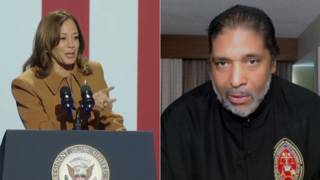
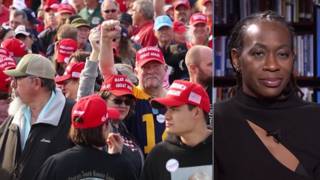
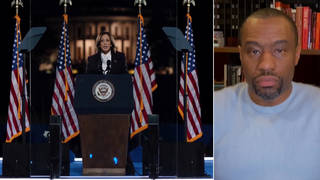



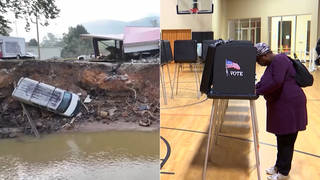


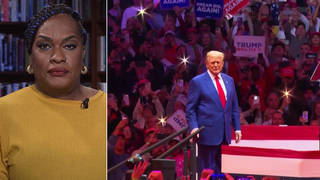
Media Options